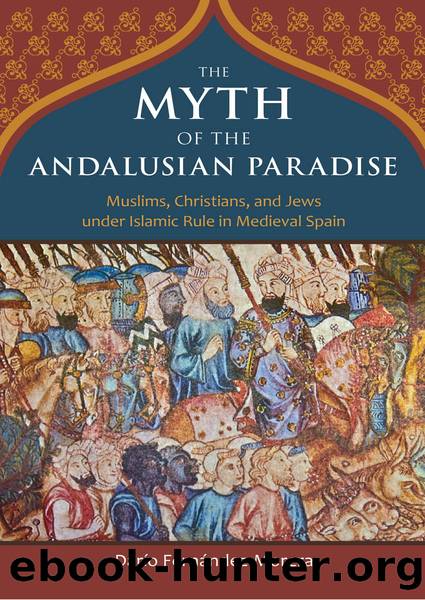The Myth of the Andalusian Paradise by Fernández-Morera Darío;

Author:Fernández-Morera, Darío;
Language: eng
Format: epub
Publisher: Intercollegiate Studies Institute
THE MARTYRS OF CÓRDOBA
[The] historical importance [of the killing of the Martyrs of Córdoba] is difficult to determine and … probably tells us little about the condition and attitudes of the bulk of the Mozarab population, though [the incident] does show the tolerance and essential reasonableness of the Muslim authorities, but it raises interesting moral and theological points about self-inflicted martyrdom.
—Hugh Kennedy, Professor of History in the Department of Languages and Cultures of the Near Middle East of the University of London, Muslim Spain and Portugal: A Political History of al-Andalus (London: Routledge, 1996), 48
But the most extraordinary instance of Christian dhimmi resistance was the episode of the martyrs of Córdoba.102 Between 850 and 860, under the reign of Umayyad Abd al-Rahman II, men and women, some of them belonging to Christian families who had converted to Islam (muladis), defied the authorities by publicly affirming their Christian faith and ridiculing or insulting Muhammad. The story has come down to us in the writings of the last of the martyrs, the monk Saint Eulogius, and in the writings of his friend Alvarus, a monk who lived through the events.
The first one to die as a martyr was a well-educated monk named Perfectus. In 850, having traveled from his nearby monastery to the city of Córdoba on some errand or other, this Christian dhimmi encountered some Muslims he knew, who asked him to explain what Christians thought of Christ and the Prophet Muhammad. He told them that they might not like the answer. When they insisted, Perfectus made them promise not to tell his answer to anyone. He proceeded to cite a passage from the gospel in which Christ declares that “many false prophets will come in my name,” and Perfectus added that Christians believed Muhammad to be one of those false prophets. Perfectus then went on his way. Some days later, the same Muslims saw him in the city, pointed him out to the crowds, and accused him of having insulted the Prophet. The monk was arrested and locked in prison, although during interrogation he denied having said any insulting words. The outline of this case to this point corresponds to the pattern of cases of Christians punished for alleged blasphemy in Islamic countries even in our day.103 While in prison, however, Perfectus recanted his earlier denial. He openly proclaimed Christ’s divinity and the imposture of Muhammad. Perfectus was publicly beheaded.
According to the extant accounts of the monk Alvarus, a year later a Christian dhimmi named Juan was denounced by some Muslim merchants for trying to increase his sales by swearing on Muhammad. Alvarus tells us that Muslims used to laugh at Christianity and insult Christians, and that Muslim envy was the reason to accuse Juan. When several Muslims testified against Juan, the dhimmi was found guilty, publicly lashed, paraded through the city, and sent to prison.
But the decisive event seems to have been the case of Isaac. At twenty-four years of age, this Christian dhimmi abandoned a lucrative position in the city of Córdoba to enter the monastic life.
Download
This site does not store any files on its server. We only index and link to content provided by other sites. Please contact the content providers to delete copyright contents if any and email us, we'll remove relevant links or contents immediately.
| Hadith | History |
| Law | Mecca |
| Muhammed | Quran |
| Rituals & Practice | Shi'ism |
| Sufism | Sunnism |
| Theology | Women in Islam |
The History of Jihad: From Muhammad to ISIS by Spencer Robert(2203)
Nine Parts of Desire by Geraldine Brooks(2002)
The Turkish Psychedelic Explosion by Daniel Spicer(1986)
The First Muslim The Story of Muhammad by Lesley Hazleton(1880)
The Essential Rumi by Coleman Barks(1629)
The Last Mughal by William Dalrymple(1568)
Trickster Travels: A Sixteenth-Century Muslim Between Worlds by Davis Natalie Zemon(1541)
1453 by Roger Crowley(1464)
by Christianity & Islam(1344)
God by Aslan Reza(1331)
A Concise History of Sunnis and Shi'is by John McHugo(1275)
Muhammad: His Life Based on the Earliest Sources by Martin Lings(1264)
Magic and Divination in Early Islam by Emilie Savage-Smith;(1194)
The Flight of the Intellectuals by Berman Paul(1179)
No God But God by Reza Aslan(1152)
Art of Betrayal by Gordon Corera(1129)
What the Qur'an Meant by Garry Wills(1118)
Getting Jesus Right: How Muslims Get Jesus and Islam Wrong by James A Beverley & Craig A Evans(1079)
The Third Choice: Islam, Dhimmitude and Freedom by Durie Mark & Ye'or Bat & Bat Ye'or(1066)
